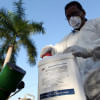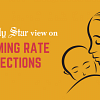75 years of improving public health

The World Health Organisation (WHO) was founded on April 7, 1948 with a mission to promote global health and ensure the highest level of health and wellbeing for everyone. This is why April 7 is observed World Health Day every year. WHO has achieved significant milestones over the years, such as the discovery of antibiotics, the development of vaccines for polio, and the establishment of the first International Health Regulations.
In the early years, WHO focused on mass campaigns against diseases like tuberculosis, malaria, yaws, syphilis, smallpox, and leprosy. WHO also created special programs like the Special Programme of Research, Development, and Research Training in Human Reproduction and the Special Programme for Research and Training in Tropical Diseases, which contributed significantly to the elimination of several diseases.
In 1978, the International Conference on Primary Health Care set the goal of "Health for All," paving the way for WHO's call for universal health coverage. WHO launched the Global Diarrhoeal Diseases Programme with Oral rehydration salts (ORS) in the same year, reducing annual deaths from diarrhoea in children under five from 4.6 million to under 365,000 by 2019.
WHO successfully eradicated smallpox in 1980 and endorsed the International Code of Marketing Breastmilk Substitutes in 1981 to promote breastfeeding. By 2022, 75% of countries had adopted legal measures to implement the Code's provisions, leading to a 50% increase in the percentage of exclusively breastfed babies.
In 1988, the Global Polio Eradication Initiative was launched, reducing polio incidence by over 99% by 2022. WHO's priorities shifted with the discovery of the Human immunodeficiency virus (HIV) in 1983 and the licensing of the first antiretroviral medication in 1987.
The Integrated Management of Childhood Illness (IMCI) strategy was launched in 1995 to reduce global child mortality by 15%, and levonorgestrel emergency contraception was approved in over 100 countries in 1998.
The Global Alliance for Vaccines and Immunisation (now Gavi) was established in 1999 to improve access to vaccines, and the Millennium Development Goals (MDGs) aimed to reduce extreme poverty and included specific health goals.
In 2001, the United Nations General Assembly adopted the Declaration of Commitment on HIV/AIDS, and created the Global Fund to fight AIDS, Tuberculosis, and Malaria. The WHO launched the "3 by 5" initiative in 2003 to provide antiretroviral treatment to 3 million people living with HIV by 2005.
WHO worked to develop influenza vaccines in record time for the emergence of the new H1N1 influenza virus in 2009. WHO also issued a menu of options in 2010 for raising resources and removing financial barriers to ensure all people have access to essential health services.
WHO achieved significant milestones in global health during the years 2011-2015. These included adopting the Pandemic Influenza Preparedness Framework, setting global targets to prevent and control non-communicable diseases (NCDs), adopting an implementation plan on maternal, infant, and young child nutrition, endorsing the first global Comprehensive Mental Health Action Plan, adopting the Every Newborn Action Plan, responding to the Ebola outbreak in West Africa, and making important accomplishments in HIV treatment coverage and malaria elimination.
In 2016, the UN General Assembly adopted a political declaration on antimicrobial resistance (AMR) and called for the establishment of an inter-agency coordination group on AMR. The Global Strategy for Women's, Children's and Adolescents' Health was launched, and WHO declared Zika infection as a Public Health Emergency of International Concern. In 2020, the Access to COVID-19 Tools Accelerator (ACT-Accelerator) partnership was launched to accelerate the development, production, and equitable access to COVID-19 tests, treatments, and vaccines.
In 2021, HIV treatment coverage reached 28.7 million people, a ground breaking malaria vaccine for children was recommended, and tuberculosis prevention and care saved over 74 million lives since 2000. In 2022, four international agencies signed a framework to tackle human, animal, plant, and ecosystem challenges, and WHO released an updated edition of "Family Planning: A Global Handbook for Providers". As WHO celebrates its 75th anniversary in 2023, it reflects on past public health successes and motivates action to address current and future health challenges.
Source: World Health Organisation

 For all latest news, follow The Daily Star's Google News channel.
For all latest news, follow The Daily Star's Google News channel. 








Comments